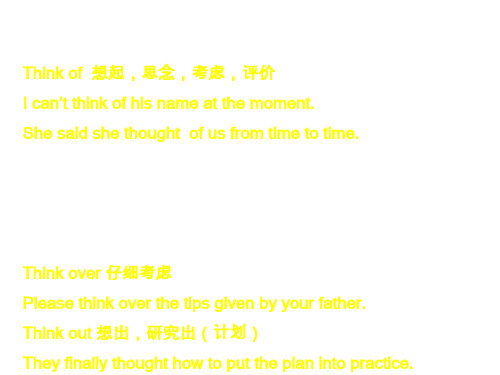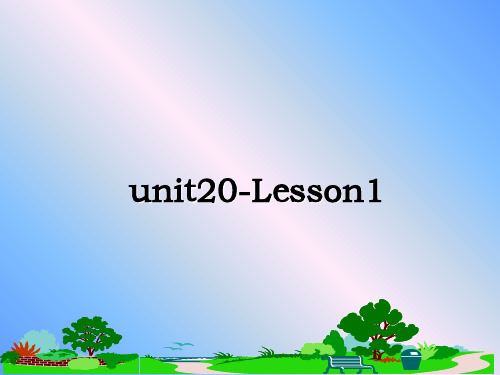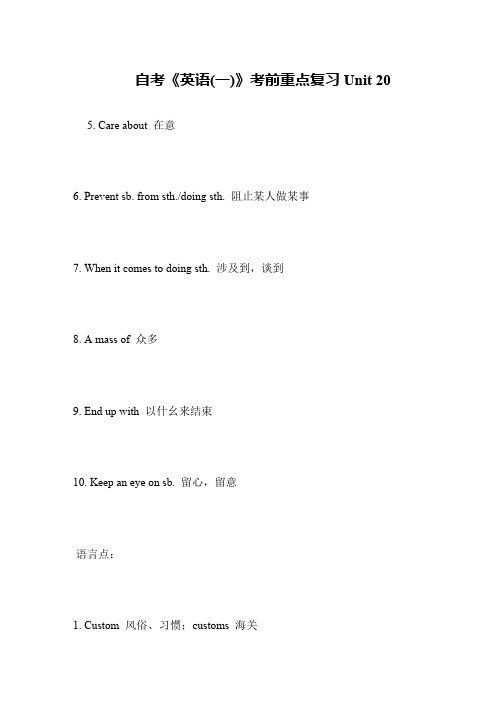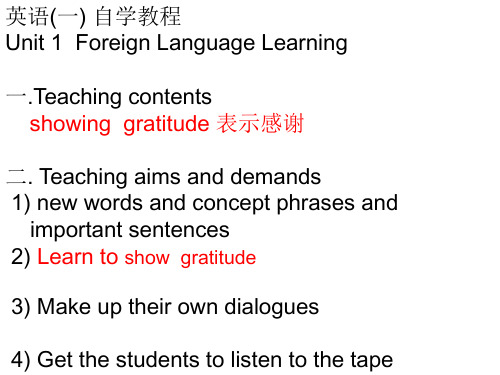自考英语一 unit 20 讲义
- 格式:doc
- 大小:32.00 KB
- 文档页数:4

Text A You Can't DO It Because It Hurts Nobody 本课主要单词 1.tough adj. 强壮的;粗暴的;⽼的;艰苦的 1)The tough mountaineer succeeded in getting to the top of the mountain. (那位强壮的登⼭运动员成功地登上了⼭顶。
) 2)Camels are tough and hardy creatures. (骆驼是能吃苦耐劳的动物。
) 3)Those tough law-breaking youngsters should be dealt with seriously. (应该严肃对待那些⽆法⽆天的青少年。
) 4)She complained about the tough steak.(她抱怨⽜排太⽼。
) 5)They had a tough time during the war. (战争期间她们苦熬度⽇。
) 6)He'll be tough on you if you bother him. (如果你⿇烦他,他会对你不客⽓。
) 7)It was tough to get a satisfactory job.(找⼀份令⼈满意的⼯作很不容易。
) 2.crime n. 罪;罪⾏ criminal n. 罪犯 adj. 犯罪的;刑事的 1)He committed a crime against the security of the state. (他犯了危害国家安全罪。
) 2)It is a crime to waste so much food. (浪费那么多⾷物是⼀种罪过。
) 3)The president is determined to bring down the crime rate. (总统下决⼼使犯罪率下降。
) 4)The wanted criminal had no place to hide. (被通缉的罪犯⽆处可藏。





Unit 1Text A How to Be a Successful Language Learner?搭配:1. disagree with 不同意/动词词组2. guarantee sth. for sb. 保证某人某事/动词词组e.g. This will not guarantee success for every adult language learner. 这样不能确保每一位学习语言的成年人都成功。
3. be different from 与什么不同/形容词词组4. succeed in sth./ doing sth. 成功做某事/动词词组5. offer advice to sb. 给某人建议/动词词组6. play with sth. 轻松学习某事物/动词词组7. in many ways 再很多方面/介词词组8. depend on sb./sth. for sth. 依靠某人或某事而获得某事/动词词组9. discover one‘‘s own way to do sth. 发现并用自己的方法做某事/动词词组10. instead of sth./ doing sth. 想反/而没有做某事/介词词组11. wait for sb. to do sth. 等待某人做某事/动词词组12. look for sth./sb. 寻找某人或某物/动词词组13. make a mistake 犯错误/动词词组14. be afraid to do sth. 害怕做某事/形容词词组15. be willing to do sth. 愿意做某事/形容词词组16. do sth. with a purpose 有目的地做某事/故意做某事/动词词组17. be interested in sth./sb. 对某人或某物很感兴趣/形容词词组18. communicate with sb. 与某人交流/动词词组19. learn from sb. 想某人学习20. might do well to do sth. 最好做某事句型:1. S.+V.+it+adj.+to do sth. 形式宾语句型 n.e.g. Some people find it difficult to succeed in language learning.Some people find it difficult to succeed in other fields.They find it easy to practice using the language regularly.2. It is +adj.+for sb.+to do sth. 形式主语句型e.g. It is more important for them to learn to think in the language than to know the meaning of every word.It is necessary for them to learn the language in order to communicate with these people and to learn for them.语言点:1. success(n.)-successful(adj.)-succeed(v.)成功2. hundreds of people与 eight hundred people:请注意有数词存在后,表量名词的变化。
Unit 20
Text A You Can‘t Do It Because It Hurts Nobody
搭配:
1.Be aware that+从句意识到
2.Range from…to…范围从什么到什么
3.Vary in degree 程度不同
4.Be tolerant of 忍受
5.Care about 在意
6.Prevent sb. from sth./doing sth. 阻止某人做某事
7.When it comes to doing sth. 涉及到,谈到
8.A mass of 众多
9.End up with 以什么来结束
10.Keep an eye on sb. 留心,留意
语言点:
1.Custom 风俗、习惯;customs 海关
2.In case+句子,表示“假如,万一”
3.Much less than 这里less是little得比较级,less than是比什么少的意思,much 放在比较级前用来强调。
4.In addition to breaking the law themselves, people tolerate various levels of crime.
5.It may be that, by seeing others do something, we accept it more easily. See sb. do sth. 看到某人做某事的全过程,或,see sb. doing sth.看到某人正在做某事
6.Most people will find it easier to speed on a highway when everybody else is driving over the speed limit.此句为形式宾语句,形式宾语句的顺序如下:主语+谓语+it+名词或形容词+动词不定式to+其他
7.We must also wonder whether seeing violence on television or reading(动名词作主语) about it in the newspapers every day makes us tolerate crime more than we should.
ed to do sth. 表示过去常常做某事
Be/get/become used to doing sth. 现在习惯于做某事
9.They may not mind cheating on taxes. Mind后面需要加动词的ing形式。
10.Acceptable 可以接受的
11.Have misconception about sth. 对什么有错误的观点
12.It is surprising+从句,之所以用surprising而不是surprised是由于它表示某事令某人惊讶;surprised更倾向于某人内心自我感到惊讶
13.10% of Canadians have a criminal record. 语法题:百分比或分数,其后如果是可数名次复数,那么谓语动词用复数;其后如果是不可数名词,谓语动词用单数。
Text B Marriage in Iran and America: A Study in Contrasts
语言点:
1.Though marriage is practiced(人们都在做的事) in almost all countries of the world, the customs are qite different from one culture to another.(第一自
然段第一句):虽然结婚是世界上几乎所有的国家的人们都在做的事情,但结婚的习俗确随文化不同而大相径庭。
2.It(形式主语) is interesting for me to(动词不定式作真正主语) compare the customs of marriage in the United States with(compare sth./sb. with sth./sb.拿什么人或时进行比较)those in my country.(第一自然段第二行)
3.I‘ve l ived in the U.S. for four years now,but I‘m still not comfortable with(对什么习惯) the customs here.我在美国已经生活了四年,但还是不习惯这里的风俗习惯。
4.In fact, what seems strange to me(主语从句中缺少主语指事用what) is that courting or dating is not always for the purpose of(为了什么的目的) finding a husband or wife.(第二自然段第二行)其实,我觉得奇怪的是,求爱或者约会的目的并非总是为了找丈夫或者妻子。
5.Do sth. as a hobby 把做什么当作习惯
6.翻译题:They seem to have a lot of freedom to decide and do what they want.(第三自然段第二行)它们有很大的自由来决定和做自己想做的事。
7.Do sth. without the knowledge of sb. 做某事而不让某人知晓
8.In fact, I have known several friends who got married(结婚) without even telling(动名词作介词宾语) their parents or other family members.
9.Wedding ceremony 结婚典礼
10.A prepared speech 准备好的演讲
11.Be willing to do sth. 愿意做某事
12.If they both say “yes,” and nobody attending(现在分词做后置定语) the wedding stands up to object(站起身反对),they are declared “man and wife.”(第四自然段倒数第四行)如果双方都说同意,并且出席婚礼的人当中也没人站起来反对,就宣布他们为夫妻。
13.Be involved in 参与
14.If she is pleased,(表示人内心的情感,用过去分词作表语)then she will return another day with her son. (第五自然段倒数第四行)如果母亲满意了,他会某天带儿子再来。
15.The actual marriage ceremony is quite different, however, from(与什么不同) the American wedding ceremonies I have seen.
16.Twice the bride must remain(保持,是个半系动词,后面接形容词) silent to the questions of the mullah.(第六自然段第六行)对毛拉(参考593页单词表里对毛拉的注解)两次提出的问题,新娘都不应作答。
17.Take care of 照顾或处理
18.Sth. given to sb. 赋予给某人某事 e.g. the freedom that is given to American youths 赋予给美国年轻人的权利。